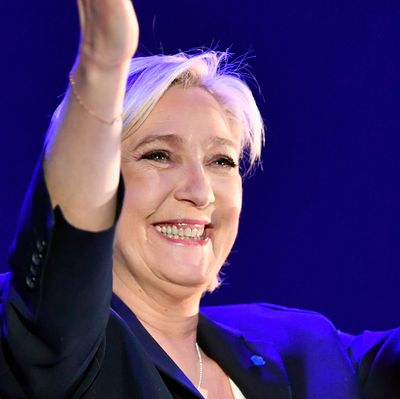
France’s first-round election results on Sunday were a welcome non-surprise: Right-wing nationalist and Putin pal Marine Le Pen did make the second round, but behind political novice but familiar center-left face Emmanuel Macron, whom she’ll face in a May runoff. Even better, their other competitors from France’s established center-left and center-right parties came out quickly to endorse Macron. The best news of the day, though, is that political observers of a liberal, non-nationalist bent can comfortably retain their basic understandings about how France, elections, and 21st-century democracy all work. They can also, at least temporarily, shelve some fundamental doubts about the state of the political process in the western world.
First, polling is not dead. FiveThirtyEight’s final seven-day rolling average of polls put Macron ahead by two points, then Le Pen, then Fillon — which seems to be what happened. So are French pollsters geniuses? No. With a margin of error of 3 percent, the top four finishers could have closed in any order and the polls still would have been “correct.” That ought to remind Americans of the polling averages we saw last November, which were correct in the aggregate, but did not translate into an Electoral College win for Hillary Clinton. The real lesson is that the more closely divided a society, the less useful a tool polling is. And yes, the polls for the French runoff are not at all close, with Macron trouncing Le Pen. The second-round outcome is not set in stone — but that kind of polling advantage means that the main remaining concern for Macron is making sure even tepid supporters actually make it to the polls.
Pundits were also quick to declare that, after Bernie Sanders and Donald Trump delivered the first blows, a Macron–Le Pen contest signifies the death of political parties in Western democracy. It’s true that Macron is running under the banner of a party he himself founded a year ago. But this assessment includes an odd oversight: Marine Le Pen’s Front National is 45 years old, has held seats in the French and European Parliaments for four decades, and been a significant force in French politics for three. It quacks like a crypto-fascist duck, but it is a major political party, and a successful one. And looking beyond France, Germany’s Angela Merkel and Canada’s Justin Trudeau are both world leaders whose success is inseparable from their party’s strength.
Here at home, recall that neither Bernie Sanders nor any of the GOP’s 2016 also-rans headed off to form a new grouping: Extant, major political parties still remain an excellent vector for moving ideas or individuals into power. They have lost their monopoly, and that’s a big deal. But being the candidate associated with an old-style bricks-and-mortar party is hardly a sure sentence of defeat — just ask Britain’s Theresa May, who looks set to drive her fissured Conservative Party over the twitching carcass of Labour like a tank in June.
Finally, the results deal a blow to fears that Russia really has election-hacking down to a science. Outside attempts to shift public opinion in the French campaign paralleled many of the tactics we now know were used in the U.S. in 2016 — but they were noticed and called out as the campaign went along. Russian news agencies reported, and thousands of bots reforwarded, completely false stories suggesting that conservative candidate and friend of Moscow François Fillon was surging in public opinion, when polls had him (correctly as it turns out) in third or even fourth place. The story died relatively quickly when polling agencies rebutted it. Press releases claimed WikiLeaks would make a news dump of damaging information on independent leftist Emmanuel Macron — which WikiLeaks then denied. A deluge of allegations against Macron included the claim that he is secretly gay — an assertion that seemed to crumble after he laughed it off in public. The sheer number of candidates targeted with attacks that seem to have emanated from Moscow highlights what observers believe was the original intent of Russian efforts here in 2016: Not so much to elect a particular candidate as to heighten public distrust of all candidates and political institutions themselves.
It’s worth noting that ISIS didn’t have had any better luck manipulating the results, as its electorally timed terror attack in Paris Thursday night doesn’t seem to have changed many minds.
But Western democracy is far from home-free. The France vote underlines the extent to which the voting public across Western Europe, as in the United States, is terribly alienated from their governments. Hate and violence are powerful tactics to move public opinion. But so are transparency and investigative journalism. Charismatic and innovative campaigners coming from any ideology, with or without strong party backing, can win an election in 2017. The larger campaign is never over though — fear always makes it into the next round.
Heather Hurlburt (@natsecHeather) directs New America’s New Models of Policy Change initiative and has held foreign-policy positions in Congress, the White House, and State Department.





























